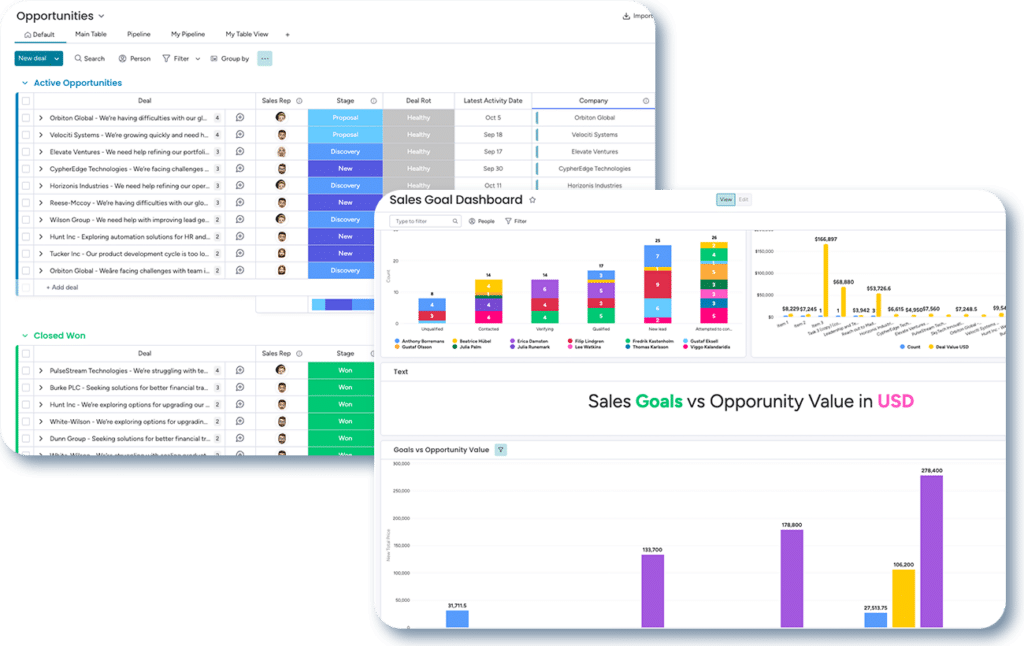Introduction to CRM in the Business Landscape
In today’s fast-paced business world, staying ahead means embracing tools that promise efficiency, growth, and a better understanding of customers. Among the pantheon of these tools, CRM (Customer Relationship Management) systems have swiftly emerged as a cornerstone for many enterprises. But as with all powerful tools, it begs the question: Is it equally valuable for everyone, especially for smaller businesses?
The Big Debate: CRM for Small Businesses
For colossal corporations with vast client databases, the decision to implement a CRM system might seem like a no-brainer. But for a small business, the waters are murkier. The crux of the matter isn’t about whether CRM systems are effective—they undeniably are—but rather if they’re a fitting solution for smaller entities. In this blog article, we’ll dive deep into the debate, weighing the tangible benefits against potential drawbacks, and aiming to provide clarity for small businesses struggling with this decision.
Demystifying CRM Systems
In the vast landscape of business tools, CRM (Customer Relationship Management) systems hold a distinctive position. But to truly appreciate their role and assess their fit for a business, one must first grasp what these systems entail and the scope of their capabilities.
The Essence of CRM: More Than Just Software
At its core, a CRM system is a comprehensive tool designed to manage and analyze customer interactions throughout the lifecycle of the client-business relationship. This extends from the very first touchpoint, perhaps when a potential customer lands on a website, to post-sale services and feedback collection. By consolidating customer data, tracking interactions, and automating certain tasks, CRM systems provide businesses with a unified platform that fosters enhanced customer relations, streamlined operations, and informed decision-making.
CRM in Different Scales: Big Corporations vs. Small Businesses
It’s a common misconception that CRM systems are reserved for the big players in the industry—those with sprawling customer databases and intricate sales processes. In reality, CRM platforms come in a spectrum of sizes and complexities, each tailored to different business needs. While large corporations might leverage expansive CRM suites with a myriad of features, there are lighter, more nimble versions crafted explicitly for small businesses. These are designed with an understanding of the unique challenges and requirements of smaller operations, ensuring that the advantages of CRM are accessible to all, not just the industry giants.

The Upside: Key Benefits of CRM for Small Businesses
The rise in CRM system adoption among small businesses isn’t merely a trend or a response to corporate FOMO (Fear Of Missing Out). It’s grounded in tangible benefits that directly influence both operations and outcomes. Let’s dive into some of these compelling advantages that a CRM system brings to the table for small businesses.
Centralized Data Management
In the digital age, data is the new gold. A CRM system offers small businesses a unified platform where all customer data — from contact details to purchase histories — is systematically stored and easily retrievable. This centralized database eliminates the chaos of scattered spreadsheets, leading to efficient data handling and, ultimately, informed decision-making.
Enhanced Customer Relations
For small businesses, every customer counts. CRM systems aid in meticulously tracking each customer’s journey, enabling businesses to tailor interactions and offers specifically to individual preferences. By recognizing and addressing unique customer needs, small businesses can foster loyalty, encourage repeat business, and build stronger relationships over time.
Efficient Sales Tracking
Predictability can be a game-changer for a small business. With a CRM system in place, sales processes become more transparent. Owners can monitor leads, track conversion rates, and identify potential bottlenecks. This clarity not only streamlines operations but also provides insights into areas of improvement, driving sales and boosting growth.
Automated Marketing Efforts
In the race against time, automation emerges as a powerful ally. CRM systems, even those tailored for smaller enterprises, often come with integrated marketing tools. These allow businesses to segment their audiences, run targeted campaigns, and even automate follow-ups. This means more effective marketing strategies with less manual intervention.
Scalability: Growing with the Business
One of the most overlooked benefits of a CRM system is its ability to scale. As a small business grows, its operational needs evolve. A robust CRM system can expand in tandem, accommodating more extensive customer databases, integrating with additional tools, and providing advanced features as and when the business requires them. This forward compatibility ensures that early investments in CRM remain relevant and beneficial over the long haul.
The Other Side of the Coin: Concerns with CRM for Small Businesses
While CRM systems undeniably offer a range of benefits to businesses of all sizes, it’s essential to approach them with a balanced perspective. Just as there are compelling advantages, there are also concerns and potential drawbacks that small business owners must consider before diving into the world of CRM.
Initial Costs
One of the primary concerns for many small business owners is the initial financial investment required to adopt a CRM system. Comprehensive CRM solutions, even those tailored for smaller operations, come with a price tag. This includes not only the software cost but also potential hardware upgrades, data migration, and integration expenses. For businesses operating on tight margins, this initial outlay can be a significant deterrent.
The Learning Curve
Implementing a new system invariably means that the team needs to adapt to new tools and processes. This transition period can be fraught with challenges, from training sessions to troubleshooting initial hiccups. There’s a time investment involved, and during this phase, businesses may face reduced productivity.
Complexity for Smaller Teams
Some CRM solutions, especially if not appropriately chosen for the business size, can overwhelm users with a plethora of features, many of which might not be immediately relevant. For very small teams, navigating this complexity can be daunting and might lead to underutilization of the system.
Maintenance and Updates
Like all software solutions, CRM systems require regular updates and occasional troubleshooting. This maintenance can lead to downtime or necessitate external IT support. Additionally, as the business landscape and customer preferences evolve, the CRM system might require modifications to stay aligned with the company’s goals and customer needs.

Critical Considerations: What to Ponder Before Investing in CRM
Taking the plunge into the CRM world is not a decision to be made lightly, especially for small businesses. It’s more than just a matter of budget; it involves understanding the business’s present dynamics, envisioning its future trajectory, and aligning the choice with both immediate and long-term goals. Here are some pivotal factors to weigh before making the investment.
Budgetary Constraints and ROI
Money often stands as one of the most significant barriers for small businesses. However, it’s essential not to view CRM purely as an expense but rather as an investment. Small businesses should consider both the immediate costs and the potential return on investment (ROI). Will the increased efficiency, improved customer relationships, and enhanced data management translate to more significant revenue or cost savings in the long run? The answer varies from one business to another.
Actual Business Needs
Every business is unique, and so are its operational needs. Before investing in a CRM, it’s paramount to evaluate what challenges the business currently faces. Does the business struggle with tracking customer interactions? Is there a need for improved marketing automation? Understanding these pain points will guide the decision-making process and ensure that the chosen CRM aligns well with actual business requirements.
Projected Business Growth
Consider the future, not just the present. How does the business envision its growth over the next few years? If rapid expansion is on the horizon, investing in a scalable CRM now might save time, effort, and resources in the future. On the other hand, if the business expects to remain at a consistent size, a more basic CRM solution might suffice.
Available Options and Customization
The CRM market is vast, with a spectrum of solutions catering to various business sizes and industries. It’s worth spending time researching different platforms, understanding their features, and assessing how customizable they are. For some businesses, a tailored CRM solution that fits their niche perfectly might be available, while others might benefit from a more general yet adaptable system.
monday.com: A Versatile CRM for Small Businesses
In the vast sea of CRM platforms available today, monday.com stands out for various compelling reasons, particularly for small businesses. Its adaptability, cost-effectiveness, and multifunctional approach make it a top contender for businesses seeking more than just a typical CRM system.
Beyond CRM: A Multifunctional Platform
One of monday.com’s primary selling points is its multifaceted nature. While it offers robust CRM capabilities, it’s much more than just a customer relationship management tool. With its wide range of workflow templates and project management features, monday.com serves as a central hub for multiple business operations. This means that small businesses don’t need to invest in separate tools for different functions. They can centralize their tasks, from sales tracking to project management, all under one platform. This not only streamlines operations but also provides cost savings.
Customization at its Best
Every business is unique, and so are its needs. monday.com understands this. Its CRM is highly customizable, allowing businesses to tailor workflows, dashboards, and tracking systems according to their specific requirements. For small businesses that might not fit the mold of larger corporations, this flexibility is invaluable. It allows them to build a CRM system that truly reflects their operations and customer relationships.
Scaling Seamlessly with Growth
Growth is the ultimate goal for many small businesses. With monday.com, this growth is facilitated seamlessly. As a business expands, its operations become more intricate. The beauty of monday.com lies in its scalability. The platform grows with the business, accommodating new needs, integrating with additional tools, and continuing to offer advanced features without the necessity of switching to a different system altogether.
Cost-effective for Comprehensive Functionality
When considering cost, monday.com presents a persuasive argument. Given its broad range of functionalities, one might expect a hefty price tag. However, the platform offers competitive pricing, especially when considering its dual role as both a CRM and a comprehensive business management tool. For small businesses, this dual functionality means getting more bang for their buck.
Charting the Path Forward: Embracing CRM with Expert Guidance
In our exploration of CRM systems and their profound impact on small businesses, one thing stands clear: the decision to implement a CRM is both strategic and transformative. But this transformation needn’t be daunting or riddled with challenges. With the right partner, the transition can be smooth, effective, and incredibly rewarding.
The Value of Expertise in CRM Implementation
Venturing into the world of CRM, especially platforms as versatile as monday.com, requires more than just a cursory understanding. Customizing the platform to match a business’s unique requirements, integrating it seamlessly with existing processes, and training the team to use it effectively are all tasks that require expertise.
This is where the true value of partnering with consultants shines. By collaborating with experts who have a deep understanding of the platform, businesses can unlock the full potential of their CRM system. Not only do they gain a system that’s tailored to their needs, but they also ensure that the implementation is both efficient and error-free.
Seamless Transformation with Training
One of the significant challenges with adopting new tools, especially something as integral as a CRM system, is the learning curve. But this challenge becomes significantly mitigated when businesses have access to expert training. Consultants provide hands-on training sessions, ensuring that every team member feels confident and empowered to use the tool to its fullest potential. This paves the way for a smoother transformation and quicker adaptation.
Omnitas Consulting: Your Partner in CRM Excellence
For businesses considering the leap into monday.com, partnering with us at Omnitas Consulting offers valuable advantages. As a world-leading partner of monday.com, we bring to the table not just technical expertise but also a deep understanding of how businesses can derive the most value from the platform. Our goal is to ensure that your CRM system isn’t just another tool but a strategic asset that drives growth, efficiency, and customer satisfaction. Apart from this, we can also help you significantly reduce your tech stack by moving other parts of your business operations into monday.com as well. Centralizing your operations into one platform not only gives you a better overview of all departments and tasks but also improves communication and productivity between departments.
To all businesses poised on the cusp of this decision, remember that the right tool, coupled with the right expertise, can be a game-changer. If you’re keen to explore whether monday.com is the ideal fit for your operations and how Omnitas Consulting can facilitate this journey, we encourage you to reach out to us below. Together, we can chart a path to CRM success tailored just for you.













